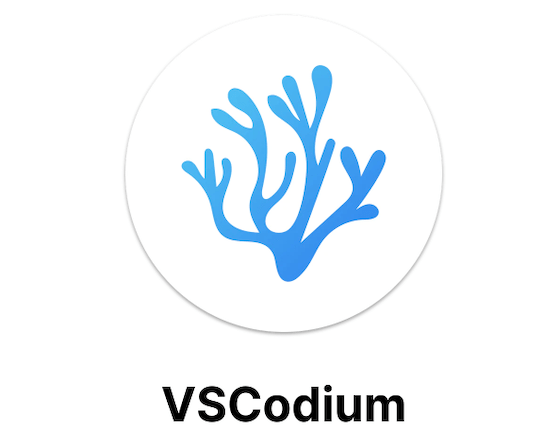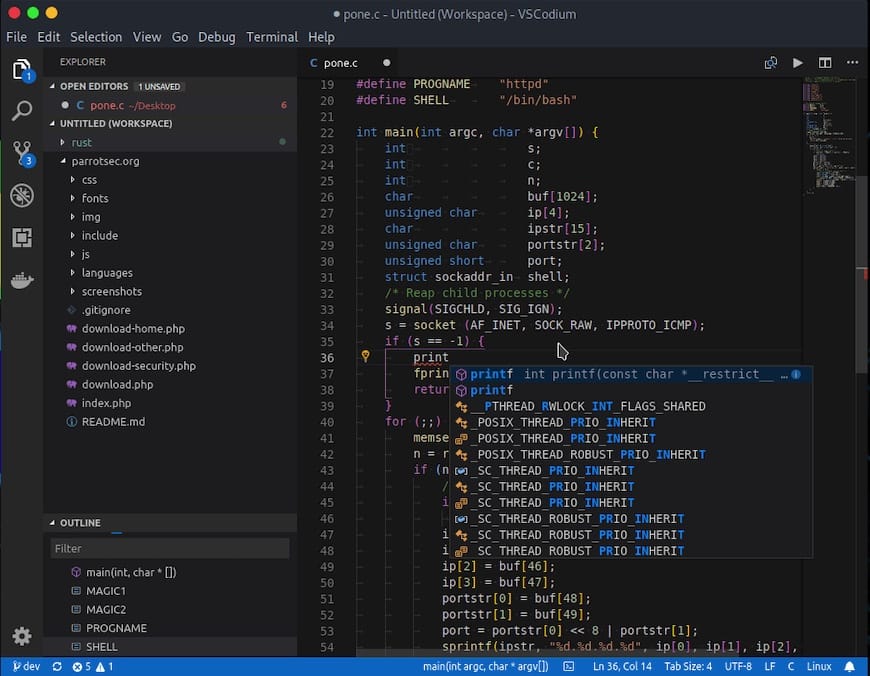How To Install VSCodium on AlmaLinux 10

VSCodium represents a privacy-focused alternative to Microsoft’s Visual Studio Code, offering developers the same powerful features without telemetry tracking. This comprehensive guide walks you through multiple installation methods for VSCodium on AlmaLinux 10, ensuring you can choose the approach that best fits your development environment.
What is VSCodium?
VSCodium is a community-driven, free and open-source distribution of Microsoft’s Visual Studio Code editor. The project exists to provide users with a clean build of VS Code that removes Microsoft’s proprietary license restrictions and telemetry collection. Unlike the official Visual Studio Code distribution, VSCodium is released under the MIT license, making it completely free to use, modify, and distribute.
The key difference lies in what happens when Microsoft builds Visual Studio Code. According to the VSCodium project documentation, Microsoft clones the open-source vscode repository and adds a customized product.json file containing Microsoft-specific functionality, including telemetry, gallery access, and proprietary branding. VSCodium eliminates these additions, providing users with a pure, tracking-free development environment.
Why Choose VSCodium on AlmaLinux 10?
AlmaLinux 10 provides an enterprise-grade, stable foundation for development work. Combining this robust operating system with VSCodium creates a powerful, privacy-respecting development environment that appeals to security-conscious developers and organizations.
The privacy advantages of VSCodium become particularly important in enterprise environments where data security and compliance are paramount. By eliminating telemetry collection, VSCodium ensures that your development activities remain private and cannot be monitored by external parties.
Performance-wise, VSCodium maintains complete feature parity with Visual Studio Code while often consuming slightly fewer system resources due to the absence of telemetry processes. This makes it an excellent choice for AlmaLinux 10 systems where resource optimization is crucial.
Prerequisites and System Requirements
System Requirements
Before installing VSCodium on AlmaLinux 10, ensure your system meets the minimum requirements:
- Operating System: AlmaLinux 10 with current updates
- RAM: 2GB minimum, 4GB recommended for optimal performance
- Storage: 200MB for VSCodium installation plus additional space for extensions
- CPU: x86_64 architecture support
- Network: Active internet connection for package downloads
User Permissions and Preparations
Successful VSCodium installation requires appropriate system permissions and preparation steps:
- Administrative Access: Sudo privileges for package installation
- Terminal Access: Command-line interface availability
- Package Manager: Functional DNF package manager
- System Updates: Current AlmaLinux 10 system patches
Before proceeding with installation, update your system to ensure compatibility:
sudo dnf upgrade --refreshThis command refreshes package databases and installs any available security updates, creating a stable foundation for VSCodium installation.
Method 1: Installation via DNF Package Manager (Recommended)
The official repository method provides the most reliable and maintainable approach to installing VSCodium on AlmaLinux 10. This method ensures automatic updates and seamless integration with your system’s package management.
System Update and Preparation
Begin by ensuring your AlmaLinux 10 system has the latest packages and security updates:
sudo dnf upgrade --refresh
sudo dnf install curl wget gnupg2The additional packages (curl, wget, gnupg2) are essential for secure repository setup and GPG key verification. These tools ensure the integrity of downloaded packages and provide secure communication channels for repository access.
Repository Setup and GPG Key Import
Security-conscious installation requires proper GPG key verification to prevent tampering with packages during download.
Step 1: Import VSCodium GPG Key
sudo rpmkeys --import https://gitlab.com/paulcarroty/vscodium-deb-rpm-repo/-/raw/master/pub.gpgThis command imports the official VSCodium repository GPG key, which authenticates packages during installation. The key verification process ensures that downloaded packages haven’t been modified or corrupted during transmission.
Step 2: Create Repository Configuration
printf "[gitlab.com_paulcarroty_vscodium_repo]\nname=download.vscodium.com\nbaseurl=https://download.vscodium.com/rpms/\nenabled=1\ngpgcheck=1\nrepo_gpgcheck=1\ngpgkey=https://gitlab.com/paulcarroty/vscodium-deb-rpm-repo/-/raw/master/pub.gpg\nmetadata_expire=1h" | sudo tee -a /etc/yum.repos.d/vscodium.repoThis configuration creates a new repository file that defines how DNF should interact with the VSCodium package repository. The settings enable GPG checking for both packages and repository metadata, ensuring maximum security during installation.
Step 3: Verify Repository Configuration
sudo dnf makecache
sudo dnf repolist | grep vscodiumThese commands refresh the package cache and verify that the VSCodium repository is properly configured and accessible.
VSCodium Installation Process
With the repository properly configured, install VSCodium using DNF:
Standard Installation
sudo dnf install codiumInsider Build Installation (Optional)
For developers who want access to the latest features and updates:
sudo dnf install codium-insidersThe insider build provides cutting-edge features but may include experimental functionality that could affect stability. Most users should install the standard version for optimal reliability.
Installation Verification
After installation completes, verify VSCodium is properly installed:
codium --version
which codiumThese commands display the installed version and confirm the executable location, typically in /usr/bin/codium.
Method 2: Flatpak Installation
Flatpak provides a universal package format that runs applications in isolated environments, offering enhanced security and consistent behavior across different Linux distributions.
Flatpak and Flathub Setup
AlmaLinux 10 includes Flatpak support, but you may need to configure Flathub as a software source:
sudo dnf install flatpak
flatpak remote-add --if-not-exists flathub https://flathub.org/repo/flathub.flatpakrepoThe --if-not-exists flag prevents errors if Flathub is already configured on your system.
VSCodium Flatpak Installation
Install VSCodium through Flatpak:
flatpak install flathub com.vscodium.codiumDuring installation, Flatpak will request permission to access various system resources. Review these permissions carefully, as they determine what system components VSCodium can access.
Launch VSCodium via Flatpak
flatpak run com.vscodium.codiumFlatpak applications run in sandboxed environments, which may limit some functionality compared to native installations. However, this provides enhanced security by isolating the application from the host system.
Method 3: Manual Binary Installation
Advanced users may prefer manual installation for greater control over the installation process and file locations.
Direct Download Method
Visit the VSCodium GitHub releases page to download the latest binary:
wget https://github.com/VSCodium/vscodium/releases/latest/download/VSCodium-linux-x64.tar.gzExtract and Install
tar -xzf VSCodium-linux-x64.tar.gz
sudo mkdir -p /opt/vscodium
sudo mv VSCodium-linux-x64/* /opt/vscodium/
sudo ln -s /opt/vscodium/bin/codium /usr/local/bin/codiumDesktop Integration
Create a desktop entry for GUI launcher integration:
sudo tee /usr/share/applications/codium.desktop > /dev/null <<EOF
[Desktop Entry]
Name=VSCodium
Comment=Code Editing. Redefined.
GenericName=Text Editor
Exec=/opt/vscodium/bin/codium %F
Icon=/opt/vscodium/resources/app/resources/linux/code.png
Type=Application
StartupNotify=true
StartupWMClass=VSCodium
Categories=TextEditor;Development;IDE;
MimeType=text/plain;inode/directory;
Actions=new-empty-window;
Keywords=vscode;
[Desktop Action new-empty-window]
Name=New Empty Window
Exec=/opt/vscodium/bin/codium --new-window %F
Icon=/opt/vscodium/resources/app/resources/linux/code.png
EOFThis desktop file enables VSCodium to appear in application menus and handle file associations properly.
Post-Installation Configuration and Launch
Launch Methods
VSCodium can be launched through multiple methods depending on your installation approach:
Command Line Launch
codiumDesktop Application Launch
Navigate to Applications → Programming → VSCodium in your desktop environment’s application menu.
Launch with Specific Options
codium --new-window /path/to/project
codium --disable-extensions
codium --verbose
Initial Configuration
Upon first launch, VSCodium presents a welcome screen with several configuration options:
- Theme Selection: Choose between light, dark, or high contrast themes based on your preferences and working environment.
- Extension Marketplace: VSCodium uses the Open VSX marketplace instead of Microsoft’s marketplace by default. This provides access to most popular extensions while maintaining the privacy-focused approach.
- Settings Sync: Configure settings synchronization if you use VSCodium across multiple systems. Note that this feature works differently than in Visual Studio Code due to the privacy-focused nature of VSCodium.
Essential VSCodium Features and Customization
Development Environment Setup
Integrated Terminal Configuration
VSCodium includes a powerful integrated terminal that supports multiple shells and customization options:
# Set default shell in VSCodium settings
"terminal.integrated.defaultProfile.linux": "bash"Configure terminal themes, fonts, and behavior through the settings interface or directly in the settings.json file.
Git Integration
VSCodium provides comprehensive Git integration without external dependencies:
- Repository Management: Clone, pull, push, and manage repositories directly from the interface
- Branch Operations: Create, switch, and merge branches with visual feedback
- Commit History: View commit history with detailed change information
- Conflict Resolution: Built-in merge conflict resolution tools
Extension Management and Recommendations
Essential Extensions for AlmaLinux Development
- C/C++ Extension: Provides IntelliSense, debugging, and code browsing for C/C++ projects
- Python Extension: Comprehensive Python development support with linting and debugging
- GitLens: Enhanced Git capabilities with blame annotations and history exploration
- Bracket Pair Colorizer: Visual bracket matching for improved code readability
Extension Installation Process
Access the Extensions view (Ctrl+Shift+X) and search for desired extensions. VSCodium uses the Open VSX marketplace, which contains most popular extensions but may lack some Microsoft-specific ones.
Troubleshooting Common Installation Issues
Repository and Network Issues
GPG Key Import Failures
If GPG key import fails, verify your internet connection and try alternative methods:
# Alternative GPG key import method
curl -fsSL https://gitlab.com/paulcarroty/vscodium-deb-rpm-repo/-/raw/master/pub.gpg | sudo rpmkeys --import -Repository Connectivity Problems
Network issues can prevent repository access. Test connectivity:
curl -I https://download.vscodium.com/rpms/If connectivity fails, check firewall settings and proxy configuration.
Package Signature Verification Errors
Signature verification failures indicate potential security issues or corrupted downloads:
sudo dnf clean all
sudo dnf makecache
sudo rpmkeys --import https://gitlab.com/paulcarroty/vscodium-deb-rpm-repo/-/raw/master/pub.gpgPermission and System Issues
SELinux Policy Conflicts
AlmaLinux 10 includes SELinux by default, which may interfere with VSCodium operation:
# Check SELinux denials
sudo ausearch -m avc -ts recentIf SELinux blocks VSCodium, create appropriate policy exceptions or temporarily set SELinux to permissive mode for testing.
File System Permission Corrections
Incorrect permissions can prevent VSCodium from accessing configuration files:
# Fix user configuration permissions
chown -R $USER:$USER ~/.config/VSCodium
chmod -R 755 ~/.config/VSCodiumApplication-Specific Issues
Black Screen or Startup Failures
If VSCodium displays a black screen or fails to start properly, try these solutions:
# Reset VSCodium configuration
rm -rf ~/.config/VSCodium
codium --disable-gpuExtension Compatibility Issues
Some extensions designed for Microsoft’s Visual Studio Code may not work properly with VSCodium. In such cases, look for alternative extensions or configure VSCodium to use Microsoft’s marketplace with appropriate modifications.
Security and Best Practices
Security Considerations
Regular Update Procedures
Maintain system security by regularly updating VSCodium and its extensions:
sudo dnf upgrade codiumFor Flatpak installations:
flatpak update com.vscodium.codiumExtension Security Evaluation
Carefully evaluate extensions before installation, particularly those from unknown developers. Review permissions and functionality to ensure they align with your security requirements.
Maintenance and Updates
Automatic Update Configuration
Configure automatic updates for repository-based installations:
# Enable automatic updates for VSCodium
sudo dnf config-manager --set-enabled vscodiumConfiguration Backup
Regularly backup your VSCodium configuration to prevent data loss:
tar -czf vscodium-config-backup.tar.gz ~/.config/VSCodiumVSCodium vs Visual Studio Code Comparison
Privacy and Licensing Differences
The most significant difference between VSCodium and Visual Studio Code relates to privacy and licensing. VSCodium removes all telemetry collection, ensuring that your development activities remain private. This makes it particularly suitable for enterprise environments where data privacy is crucial.
Visual Studio Code, while built from open-source code, includes proprietary elements and telemetry collection in its distributed version. These features provide Microsoft with usage statistics but may raise privacy concerns for some users.
Extension Marketplace Differences
VSCodium uses the Open VSX marketplace instead of Microsoft’s Visual Studio Code Marketplace. While most popular extensions are available through Open VSX, some Microsoft-specific extensions may not be accessible. However, VSCodium can be configured to use Microsoft’s marketplace with appropriate modifications.
Performance Comparison
In practical use, VSCodium and Visual Studio Code perform similarly on AlmaLinux 10 systems. The absence of telemetry processes in VSCodium may result in slightly better performance, particularly on resource-constrained systems.
Advanced Tips and Productivity Enhancements
Workflow Optimization
Keyboard Shortcuts Customization
Customize keyboard shortcuts to match your workflow preferences:
{
"key": "ctrl+shift+t",
"command": "workbench.action.terminal.new"
}Multi-Project Workspace Setup
Configure workspaces for managing multiple related projects simultaneously:
{
"folders": [
{"path": "/path/to/project1"},
{"path": "/path/to/project2"}
],
"settings": {
"editor.fontSize": 14
}
}Integration with AlmaLinux Tools
Container Development Setup
VSCodium integrates well with container development workflows on AlmaLinux 10:
# Install container tools
sudo dnf install podman buildahUse the Remote-Containers extension equivalent for developing inside containers while maintaining isolation and consistency.
System Administration Integration
Configure VSCodium for system administration tasks:
- SSH Configuration: Edit SSH configurations with syntax highlighting
- Log File Analysis: Use extensions for log file parsing and analysis
- Script Development: Develop shell scripts with advanced editing features
Congratulations! You have successfully installed VSCodium. Thanks for using this tutorial for installing VSCodium on AlmaLinux OS 10 system. For additional help or useful information, we recommend you check the VSCodium website.